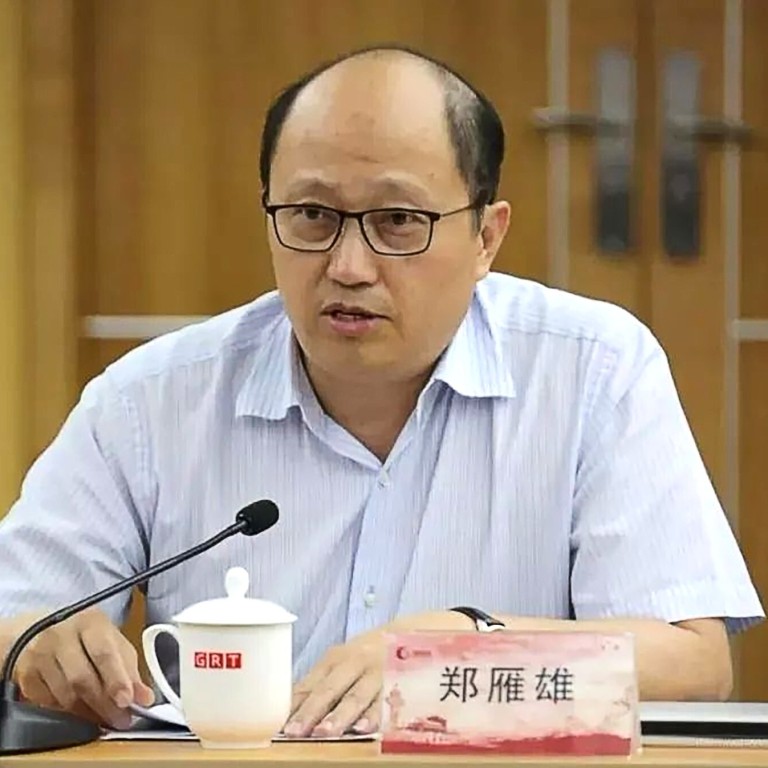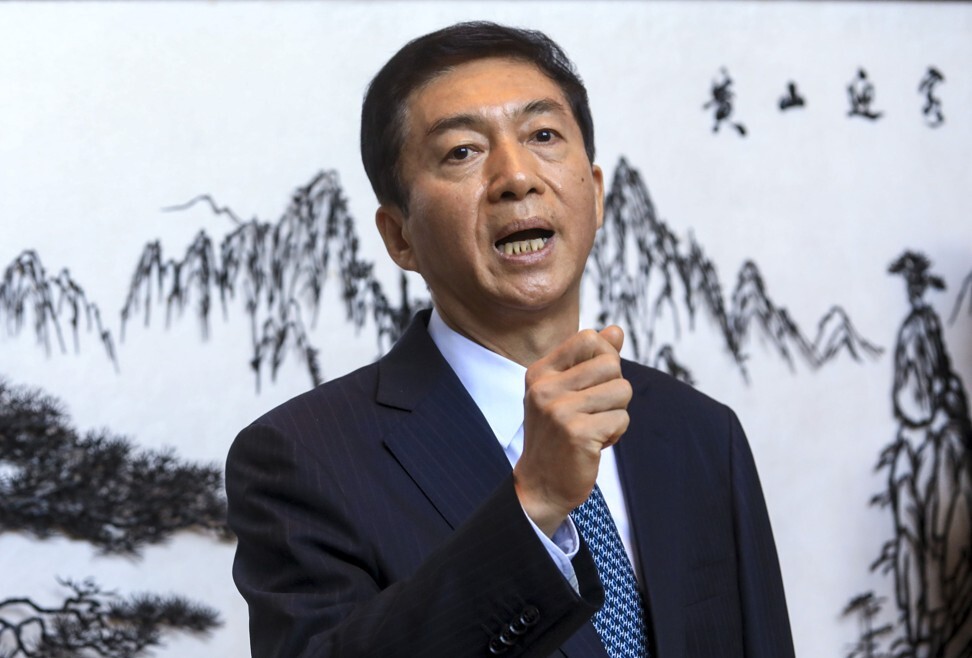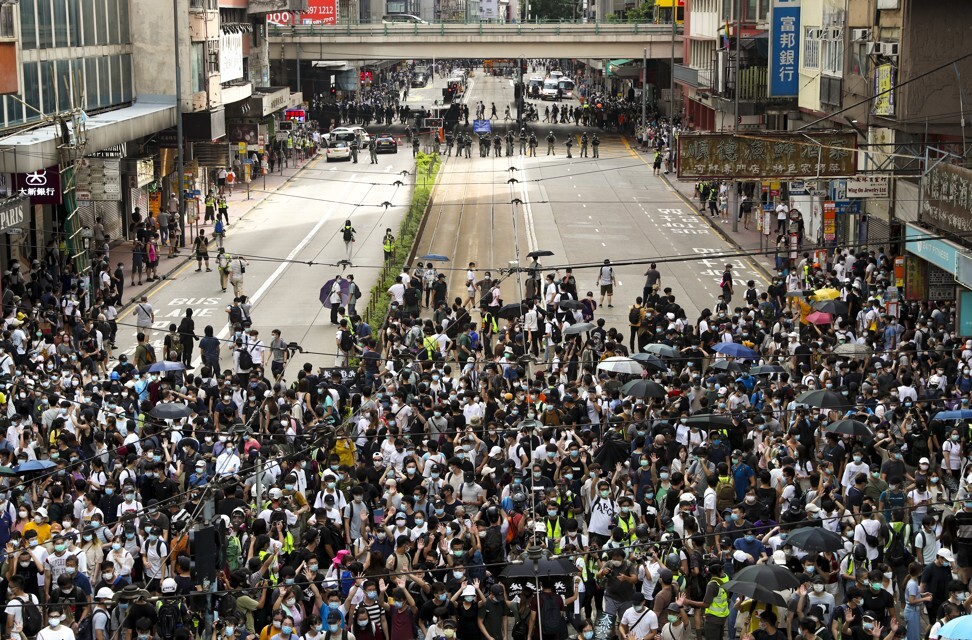
National security law: Beijing appoints tough-talking party official Zheng Yanxiong to lead powerful new agency in Hong Kong
- Zheng Yanxiong, known for his hardline approach to handling protests in Guangdong, will head Beijing’s office in Hong Kong while Luo Huining will act as Carrie Lam’s national security adviser
- Country’s top legislative body could make more laws for the city to safeguard national security in the future, senior official says
That came just hours before another senior Beijing official said China’s top legislative body could draft more laws for Hong Kong to safeguard national security in the future.
“On May 28, the National People’s Congress authorised its standing committee to enact legislation on national security for Hong Kong. But I must emphasise that this authorisation is not a one-off,” Deng Zhonghua, deputy chief of the State Council’s Hong Kong and Macau Affairs Office, told CCTV.

05:50
What you should know about China's new national security law for Hong Kong
“Based on Hong Kong’s actual situation, the standing committee can continue to make more laws, and lay down penalties for acts that threaten national security.”
Luo Huining, director of Beijing’s liaison office in Hong Kong, will serve as the city leader’s top adviser on the local Committee for Safeguarding National Security. Lam also appointed senior police officer Edwina Lau Chi-wai to lead the dedicated unit set up by the force to enforce the legislation, and designated six serving magistrates to handle cases.
Welcoming the new appointments, Lam said: “My government will fully cooperate with the adviser and the national security office … and will do our utmost in enforcing the national security law, and fulfilling the city’s responsibility in safeguarding national security.”
Hong Kong national security law official English version:
As the top party official in the Guangdong city of Shanwei, the 56-year-old was heard, in leaked video from a government meeting, saying villagers were “colluding with foreign media to create trouble”.
Zheng also said in the controversial remarks made during the Wukan protests that “pigs will fly before the foreign press can be trusted”.
He later defended his controversial comments, telling a Guangzhou-based magazine that he had tried to use a colloquial Hong Kong expression that had not come across in the manner intended.
The Wukan incident did not have a negative impact on Zheng’s career, as he was appointed deputy propaganda chief of Guangdong in 2013.
Hong Kong national security law puts Facebook, Twitter under pressure
In other State Council appointments announced on Friday by Xinhua news agency, Zheng’s deputies in the national security office were named as Li Jiangzhou and Sun Qingye.
The committee chaired by Lam, meanwhile, is responsible for formulating policies, assessing developments, and coordinating major work and significant operations relating to safeguarding national security.

Lam has appointed Lau, the former police director of management services, as the force’s third deputy commissioner to lead the special unit being set up to gather intelligence and enforce the security law.
The chief executive, after consulting the committee and the city’s top judge, has also designated six current magistrates to handle cases related to national security.
Activist Nathan Law reveals he has fled Hong Kong to undisclosed location
There was no official announcement on the names and nationalities of the six, but it was revealed that one of them was Chief Magistrate Victor So Wai-tak, as on Friday he presided over the case of Tong Ying-kit, a 23-year-old motorcyclist accused of riding into a group of policemen during the protest on July 1, while carrying a flag calling for the liberation of Hong Kong.
Tong was the first person to be charged under the new legislation, according to police. He was not present and was expected to return to court on July 6.
Asked if the identities of the other five magistrates would be made public, the judiciary referred the Post to the Chief Executive’s Office, but it said it had nothing to add to the statements issued on Friday.
So was appointed chief magistrate in January after more than a decade with the judiciary. In November last year, he ruled on the first case involving an anti-government protester carrying a laser pointer. He ordered a 16-year-old man to spend at least three months in a rehabilitation centre.
In April last year, he fined engineer Otto Poon Lok-to, husband of Secretary for Justice Teresa Cheng Yeuk-wah, HK$20,000, after finding him guilty of building without planning permission a pool that formed an integral structure in his garden.
He also found democracy activist Howard Lam Tsz-kin guilty of making a false police report in January last year, rejecting the defendant’s claim that he was abducted and tortured by mainland agents.
Later on Friday, the chief magistrate’s personal information was being circulated on the Telegram messaging app, disclosing details including the full names of So, his wife and their child, as well as the couple’s phone numbers. So’s home address and identity card number were also exposed.
A spokesman from the judiciary said the matter had been referred to police. “It is inappropriate for the judiciary to comment,” he added.
China lashes out at Five Eyes as Britain, Australia offer to help Hongkongers
Chief Justice Geoffrey Ma Tao-li insisted on Thursday that foreign judges should not be excluded from cases, an assurance given earlier by Carrie Lam but which was contradicted by senior Beijing official Zhang Yong’s suggestion that the city’s leader must avoid picking those who could be compromised by “dual allegiance” because of their foreign nationality.
Other members of the committee include the city’s ministers for administration, justice, finance and security, as well as the heads of police, immigration and customs. Eric Chan Kwok-ki, director of the Chief Executive’s Office, will serve as its secretary general.
A government spokesman also confirmed that the justice department had set up a dedicated unit to handle prosecutions related to national security.
After consulting the committee, the first batch of prosecutors has been appointed by the justice secretary, but the head of the new unit has yet to be appointed.

Opposition lawmaker Claudia Mo Man-ching, a former journalist, said the appointment of Zheng was “very worrying”.
“His comments about the foreign press show a ‘bamboo curtain’ mentality, as if mainland China does not need to interact with the outside world,” she said.
But Ip Kwok-him, a local deputy to the National People’s Congress, China's legislature, said the central government could not appoint weak officials for national security roles.
“They have to be strong characters to execute the central government’s public and national security,” he said. “They are experienced officials and capable of taking up these roles.”

03:25
Hong Kong police arrest 10 under new national security law
Tam Yiu-chung, the city’s sole delegate to the NPC standing committee, described Li, unveiled as one of Zheng's deputies, as a reasonable choice.
“He heads the police communication unit, and is familiar with the operation of the law enforcement agencies in Hong Kong and the mainland. He has also been working in Hong Kong for several years,” he said.
Professor Lau Siu-kai, vice-chairman of semi-official Beijing think tank the Chinese Association of Hong Kong and Macau Studies, believed that Luo’s role on the committee would not be purely advisory.
“On national security, the central government definitely has a bigger say than the city’s government. If the adviser’s advice comes from Beijing, I believe that it will be hard for the city’s government to reject it,” he said.
Hong Kong restaurant warned by police over anti-government posters
Lau also believed that Zheng’s experience in Guangdong would help him in his new post.
“Guangdong is our neighbour. If anyone is using Hong Kong as a base to endanger national security, the mainland province will be the most affected,” he added.
Separately, in a notice on Friday night to all primary, secondary and special schools and kindergartens, the Education Bureau said it would make strenuous efforts to support them through a multipronged approach to reinforce the learning elements of national security education. That included the renewal of the curriculum and development of learning and teaching examples and resources.
Professional development programmes for principals and teachers would also be organised.
It also said that all levels of school personnel, including management and all teaching and non-teaching staff, should pay attention to the legislation’s provisions and relevant information released by the government to grasp correctly the key messages they conveyed and the scope of application.
Additional reporting by Chris Lau and Danny Mok

